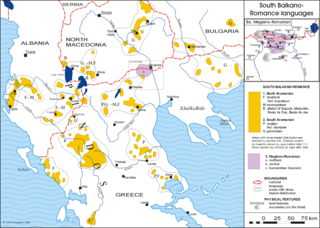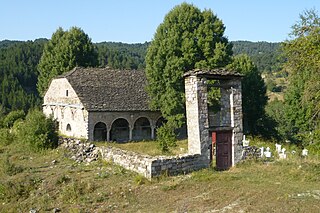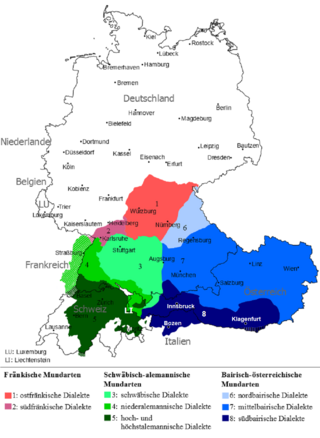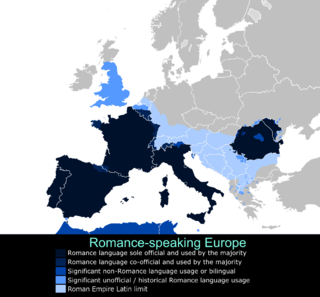
Dalmatian or Dalmatic was a group of Romance varieties that developed along the coast of Dalmatia. Over the centuries they were increasingly influenced, and then supplanted, by Croatian and Venetian.

Karl Ferdinand Gutzkow was a German writer notable in the Young Germany movement of the mid-19th century.

The term romance has a centuries-long history. Applied to narrative ballads in Spain, it came to be used by the 18th century for simple lyrical pieces not only for voice, but also for instruments alone. The Oxford Dictionary of Music states that "generally it implies a specially personal or tender quality".

Franz Xaver Wolfgang Mozart, also known as Wolfgang Amadeus Mozart, Jr., was the youngest child of six born to Wolfgang Amadeus Mozart and his wife Constanze and the younger of his parents' two surviving children. He was a composer, pianist, conductor, and teacher of the late classical period whose musical style was of an early Romanticism, heavily influenced by his father's mature style. He knew Franz Schubert and Robert Schumann, both of whom held him in high esteem.

Helmut Käutner was a German film director active mainly in the 1940s and 1950s. He entered the film industry at the end of the Weimar Republic and released his first films as a director in Nazi Germany. Käutner is relatively unknown outside of Germany, although he is considered one of the best filmmakers in German film history. He was one of the most influential film directors of German post-war cinema and became known for his sophisticated literary adaptations.

Yehuda Alharizi, also Judah ben Solomon Harizi or al-Harizi, was a rabbi, translator, poet, and traveler active in al-Andalus. He was supported by wealthy patrons, to whom he wrote poems and dedicated compositions.

Hans Robert Jauss was a German academic, notable for his work in reception theory and medieval and modern French literature. His approach was derived from the hermeneutics of Hans-Georg Gadamer.

Michael Kiesling is a German board game designer. Many of his games have been nominated for or have won the Spiel des Jahres, a German games award.
Wolfgang Hofmann was a West German judoka who competed in the 1964 Summer Olympics in Tokyo, where he won the silver medal in the middleweight class representing the United Team of Germany.

Wolfgang Fritz Haug was from 1979 till his retirement in 2001 professor of philosophy at the Free University Berlin, where he had also studied romance languages and religious studies and taken his PhD.

The Aromanian language, also known as Vlach or Macedo-Romanian, is an Eastern Romance language, similar to Megleno-Romanian, Istro-Romanian and Romanian, spoken in Southeastern Europe. Its speakers are called Aromanians or Vlachs.

The St. Athanasius Church, is an Orthodox church in Moscopole, Albania.

Upper German is a family of High German dialects spoken primarily in the southern German-speaking area.
Deutscher Science Fiction Preis is a German literary award. Together with the Kurd-Laßwitz-Preis, it is one of the most prestigious awards for German science fiction literature. The award was established in 1985 by the Science Fiction Club Deutschland, a German Science Fiction society. Each year, the award is given to the best German science fiction short story and the best German novel from the previous year.
Max Pfister was a Swiss Romance studies scholar and linguist.

Moselle Romance is an extinct Gallo-Romance dialect that developed after the fall of the Roman Empire along the Moselle river in modern-day Germany, near the border with France. It was part of a wider group of Romance relic areas within the German-speaking territory. Despite heavy Germanic influence, it persisted in isolated pockets until at least the 11th century.
Dagmar Droysen-Reber was a German musicologist and museum director.
Proto-Romance is the comparatively reconstructed ancestor of the Romance languages. It is effectively Late Latin viewed retrospectively through its descendants.
Éva Buchi is a Swiss linguist and lexicographer specializing in the Romance languages.

The Monastery of the Holy Apostles is an Eastern Orthodox monastery in Kleino, Greece. It is located 2 kilometres northeast of the settlement itself, on a plateau of difficult accessibility. The monastery was built approximately in the middle of the 18th century, its construction having been overseen by bishop Stagi Paisios. It is built in the style of the monasteries of Mount Athos.













